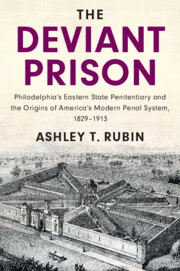 The Deviant Prison
The Deviant Prison Book contents
- Frontmatter
- Contents
- List of Figures
- List of Tables
- Acknowledgements
- List of Abbreviations
- A Brief Timeline
- Important Actors
- Introduction
- Part I Becoming the Deviant Prison: Establishing The Conditions for Personal Institutionalization
- Part II THE ADVANTAGE OF DIFFERENCE: The Process of Institutionalization
- 5 Neutralizing the Calumnious Myths: Administrators’ Public Defense of the Pennsylvania System
- 6 Combatting the Pains of Deviance: Organizational Defense As Self-Defense
- B Behind the Scenes
- 7 Strategic Manipulations: Acceptable and Unacceptable Violations of the Pennsylvania System
- 8 Turning a Blind Eye: Reputation and the Limits of Administrative Commitment
- Part III Forced to Adapt: The Conditions for and Process of Deinstitutionalization
- Appendix A Inspectors
- Index
7 - Strategic Manipulations: Acceptable and Unacceptable Violations of the Pennsylvania System
from Part II - THE ADVANTAGE OF DIFFERENCE: The Process of Institutionalization
Published online by Cambridge University Press: 12 January 2021
- Frontmatter
- Contents
- List of Figures
- List of Tables
- Acknowledgements
- List of Abbreviations
- A Brief Timeline
- Important Actors
- Introduction
- Part I Becoming the Deviant Prison: Establishing The Conditions for Personal Institutionalization
- Part II THE ADVANTAGE OF DIFFERENCE: The Process of Institutionalization
- 5 Neutralizing the Calumnious Myths: Administrators’ Public Defense of the Pennsylvania System
- 6 Combatting the Pains of Deviance: Organizational Defense As Self-Defense
- B Behind the Scenes
- 7 Strategic Manipulations: Acceptable and Unacceptable Violations of the Pennsylvania System
- 8 Turning a Blind Eye: Reputation and the Limits of Administrative Commitment
- Part III Forced to Adapt: The Conditions for and Process of Deinstitutionalization
- Appendix A Inspectors
- Index
Summary
This chapter examines two strategies Eastern's administrators used in their annual reports to challenge one of the most effective—and personally detrimental—myths: the Pennsylvania System’s cruelty and inhumanity. To undermine this myth, Eastern's administrators used several techniques of neutralization, characterizing the Pennsylvania System and themselves as a kind, benevolent, and humane, while arguing that the Auburn System’s supporters were the opposite—profit mongers willing to resort to cruel practices. These techniques allowed the administrators to defend themselves against charges that they were engaging in cruel and inhumane behavior. Because of their defensive posture the administrators could sublimate their own self-praise into the prison’s defense. Thus, administrators' statements defending the Pennsylvania System were often as much about the administrators themselves as the system they sought to defend. Indeed, the ability to constantly issue these statements incentivized Eastern's administrators to maintain the Pennsylvania System for as long as they did. These claims were the largest anchor keeping the Pennsylvania System personally institutionalized.
Keywords
- Type
- Chapter
- Information
- The Deviant PrisonPhiladelphia's Eastern State Penitentiary and the Origins of America's Modern Penal System, 1829–1913, pp. 201 - 229Publisher: Cambridge University PressPrint publication year: 2021


